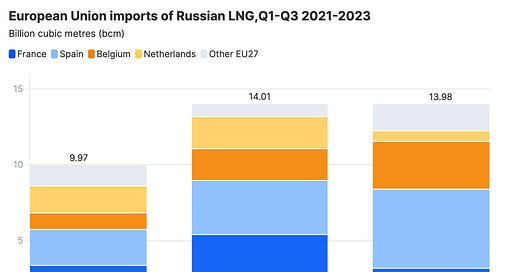This Week:
European farmers are fed up.
Red Sea crisis ending? Not so fast.
Russian LNG still flowing through.
Farmers
Farmers inside the EUSSR are getting fed up.
German farmers unhappy with subsidy cuts.
French farmers unhappy with government rules making them less competitive.
Dutch, Belgian and other nations farmers protesting in Brussels against more regulations, fines and less efficient farming for climate change.
The more you centrally plan economies with subsidies, quotas, restrictions, and regulations for the sake of virtue signalling, you end up destroying business, disincentivizing supply, increasing prices for all and making the entire system less efficient and ultimately chaotic and unfit for purpose.
Sadly after I added this story, it appears the French farmers are giving up the fight after some token concessions organised by their unions. This is a shame considering the farmers had the government in very tough position. If they had held firm there is a chance they could have forced Marcon out. Instead they’ll get a token few hundred million dispersed through various mechanisms and be in the same position they are in now, albeit slightly better.
This is what happens when you hand power over to union blocks who will be able to organise favourable backdoor deals for themselves.
Red Sea
The world continues to underestimate the conflict in the Red Sea presents to shipping.
As it stands, the US and UK navies provide the primary defence with their anti-air destroyers in gatekeeper positions between the coast of Yemen and the shipping channels in the Red Sea and Gulf of Aden, Mercogliano explained. Other navies provide direct support and escort for high value ships or ones with the greatest chance of attack.
“There are a number of military assets operating within the region, however, there are currently no formal escort plans in place. The best protection against the drone and missile threat is to avoid the area,” Ranslem advised.
The talk of military escorts or convoys is misguided at best and delusional at worst. It won't solve the issue;
1) You can't escort every ship.
2) Even if you did, it doesn't stop the missile attempts. So responsible ship managers would still need to avoid the area or continue to put their employees at risk.
Aurelien states the case well:
…drones and relatively inexpensive missiles cannot give you control of the sea, but they can prevent others having it, and enjoying safe passage through it. As we have seen, commercial shipping companies are generally not prepared to take risks beyond a certain point, and that point may be very early on in the process of escalation. An occasional successful strike on a merchant ship, even if no serious damage is done, may be all that is needed to bring maritime trade to a halt. By contrast, trying to keep such routes open would demand massive, continuous and expensive efforts that would probably be beyond the resources of the West over any length of time. Moreover, because the loss of even one western naval ship to missile attack would be a political disaster, it’s doubtful if many states would want to take part in such efforts anyway. As experience in Ukraine has shown, sheer numbers of attacking missiles are important in themselves, and western ships that have exhausted their air defence assets, even if they have suffered no damage, will be pretty much obliged to leave the area.
…the absolute “freedom of the seas” may soon be consigned to history, given the ability of coastal nations to use relatively cheap missiles to disrupt shipping and threaten military vessels. Again, it’s important to get out of the mental habit of thinking of “winning” and “losing.” We have already seen how the Houthis are using their (relatively limited) missile capability to disrupt commercial shipping in the Red Sea, and put pressure on the US to put pressure on Israel to stop its war in Gaza. The US and other western nations have massively more military power than the Houthis, but the two sides are trying to do fundamentally different things. Whether the Houthi objective of putting pressure on the US will succeed is impossible to say, but their interim objective of disrupting shipping is much easier to accomplish than their opponent’s objective of maintaining freedom of navigation.
The solution is diplomacy in the Middle East to stop the Israeli attack on Gaza which will bring the Houthi’s to the negotiating table. Not flexing misguided military might that will prove ineffective at achieving it’s goal for trade, that is real safety of passage.
We are starting to see what appears like genuine attempts at a cease fire now. Whether it sticks remains to be seen, and whether it will be sufficient to allay the concerns of shipping companies in the near term is another question still.
Talk vs Reality
There is always a lot of talk about banning Russian gas into the EUSSR.
Policymakers in Brussels are working to finalise legislation that would allow member states to fully ban Russian gas imported via pipeline as well as LNG, nearly two years since Moscow’s full-scale invasion of Ukraine prompted the bloc to start weaning itself off hydrocarbons from Russia.
Obviously blowing up pipelines will have a dramatic effect on the overall volume. But when it comes to voluntary business dealing between member states and Russia for LNG, the numbers tell more a story of continued demand than virtue signalling.





